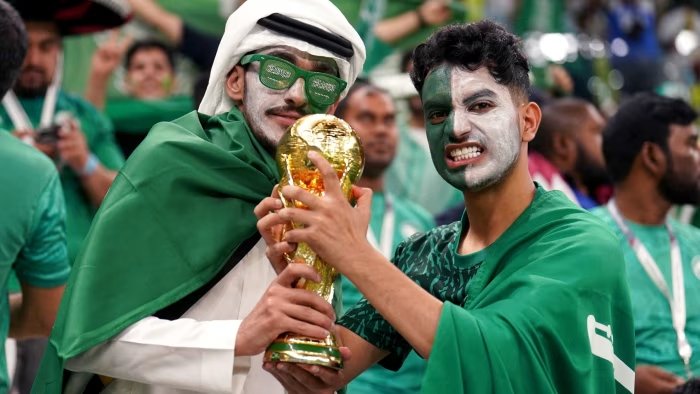The Fédération Internationale de Football Association (FIFA) has officially granted Saudi Arabia the hosting rights for the 2034 FIFA World Cup, marking a historic moment for the oil-rich kingdom. The announcement, made on Wednesday during a virtual FIFA Congress, has drawn mixed reactions worldwide.
Supporters see the decision as a testament to Saudi Arabia’s growing influence in global sports, while critics accuse FIFA of enabling “sportswashing,” pointing to the nation’s record on human rights and authoritarian governance.
Saudi Arabia was the sole contender for the tournament after FIFA restricted bids to Asia or Oceania and gave countries only a month to submit proposals. Early withdrawals by Australia and Indonesia left the kingdom unchallenged.
Crown Prince Mohammed bin Salman has been a key driver of Saudi Arabia’s sporting ambitions, using high-profile events such as Formula 1 races, LIV Golf, and heavyweight boxing to enhance the country’s global image. Hosting the 2034 World Cup is poised to be the pinnacle of these efforts, showcasing Saudi Arabia’s commitment to sports as a vehicle for influence and economic growth.
Despite its ambition, Saudi Arabia faces logistical hurdles. The country currently has only two stadiums that meet FIFA’s capacity requirements, necessitating the construction or renovation of 12 more. Additionally, the region’s extreme summer heat may prompt a schedule shift, potentially moving the tournament later in the year, as seen with Qatar’s 2022 World Cup. The timing of Ramadan in December 2034 may further complicate planning.
Criticism of FIFA’s decision has been swift from human rights organizations, who cite Saudi Arabia’s mass executions, restrictions on free speech, and ongoing gender inequality under its male guardianship system. However, FIFA has defended its choice, focusing on the kingdom’s significant investments in sports infrastructure and its potential to advance the game globally.
Meanwhile, FIFA also confirmed the 2030 World Cup hosts: Morocco, Spain, and Portugal. To celebrate the tournament’s centenary, a match each will be played in Uruguay, Argentina, and Paraguay, honoring the inaugural World Cup held in 1930 in Uruguay. The final is scheduled for July 21, with Spain likely to host at iconic venues such as Madrid’s Santiago Bernabeu or Barcelona’s renovated Camp Nou.
Morocco plans to debut the world’s largest stadium, the 115,000-capacity Hassan II Stadium, as part of its contribution to the first multi-continental World Cup.
As Saudi Arabia gears up to host its first World Cup in 2034, the expanded 48-team format promises a landmark event. However, the decision underscores the growing role of wealth and geopolitics in shaping international sports, fueling ongoing debates about the balance between progress and principles in the global arena.



























